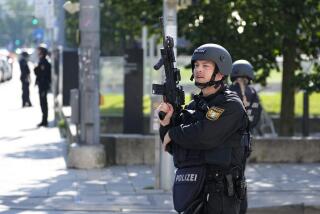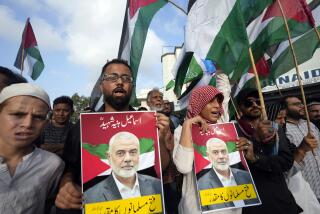Off-duty police officer identified in fatal shooting of Russia’s ambassador to Turkey
- Share via
Reporting from ISTANBUL, Turkey — An off-duty Turkish police officer who shouted, “Don’t forget Syria and Aleppo!” shot and killed Russia’s ambassador to Turkey on Monday as he delivered a speech in the capital, Ankara — a bloody episode that was captured on video and posted on social media.
President Recep Tayyip Erdogan, in a nationally televised statement, called the assassination a “provocation” meant to hurt Turkey’s ties with Russia. Russian President Vladimir Putin, meanwhile, vowed that the “bandits” responsible would pay the price.
“A crime has been committed and it was without doubt a provocation aimed at spoiling the normalization of Russo-Turkish relations and spoiling the Syrian peace process,” Putin said in televised comments from Moscow. “There can only be one response — stepping up the fight against terrorism.”
The assailant, identified by Turkish officials as Mevlut Mert Altintas, a 22-year-old off-duty riot policeman, was gunned down by security forces. The ambassador, who was shot multiple times, was pronounced dead at the hospital a short time after the attack, officials said.
The assassination appeared to represent the latest violent spillover of the Syrian conflict into neighboring Turkey. Suicide bombings linked to the fighting in Syria have become almost commonplace in Turkey, often causing mass casualties, but this was the first deadly attack on a senior diplomat that was seemingly motivated by the brutal and multi-sided war next door.
Russia and Turkey, which have both intervened militarily in Syria, are on opposite sides of the conflict. Russian firepower has helped Syrian President Bashar Assad cling to power and recapture opposition-held east Aleppo; Turkey has allied itself with some of the rebels seeking to topple him.
The video of the attack, which took place at a photo exhibition sponsored by the Russian Embassy, shows the envoy — veteran diplomat Andrei Karlov, 62 — collapsing minutes into his speech after apparently being shot from behind. The gunman moves into the frame, clad in a black suit and tie and holding a handgun, and can be heard shouting in Turkish as onlookers flee in panic. At least three bystanders were reported injured.
“We die in Aleppo, you die here!” the shooter yells out before firing several shots into the air. “You will not taste security until our towns are secure! Do not forget about Syria and Aleppo! Whoever is part of it will get their punishment!”
U.S. Secretary of State John F. Kerry called the assassination “a despicable attack” and “an assault on the right of all diplomats to safely and securely advance and represent their nations around the world.” He pledged U.S. help in pursuing the investigation.
In New York, President-elect Donald Trump also responded to the attack: “Today we offer our condolences to the family and loved ones of Russian Ambassador to Turkey Andrei Karlov, who was assassinated by a radical Islamic terrorist,” he said in a statement.
“The murder of an ambassador is a violation of all rules of civilized order and must be universally condemned.”
The basis for Trump’s claim that the incident was an act of Islamist terrorism is unclear; Turkish officials have said they are investigating the attack as a possible act of terrorism, but have raised various possible political motivations.
Supporters of Erdogan were quick to draw a connection to July’s attempted coup, which was followed by a purge of tens of thousands of suspected political opponents. The mayor of Ankara, Ibrahim Melih Gokcek, who is from Erdogan’s Justice and Development Party, claimed the shooter was a follower of Fethullah Gulen, an elderly cleric living in self-exile in the United States and blamed by Turkey for masterminding the coup attempt.
After the coup attempt, the president’s camp has consistently sought to implicate followers of Gulen in almost any unfortunate turn of events.
Relations between Turkey and Russia nosedived in November 2015 after Turkey shot down a Russian fighter jet along the Syrian border. Erdogan this year had a fence-mending session with Putin, and the two countries have agreed to revive a natural-gas pipeline project that had been suspended, among other cooperative steps.
The two countries have also cooperated to a degree on Aleppo. The killing came on the eve of planned talks in Moscow between Turkish Foreign Minister Mevlut Cavusoglu and his Russian counterpart, Sergei Lavrov, on the humanitarian crisis in the Syrian city.
The assassination came on the heels of near-daily protests outside the Russian Embassy in Ankara, as well as the consulate in Istanbul. Thousands of Turks and Syrians have been holding rallies at the Russian diplomatic outposts, as well as at Iran’s consulate and embassy, over the two governments’ war roles in support of Assad. The demonstrations have escalated amid reports of heavy civilian casualties in Aleppo during the recapture of the city’s eastern sector from the rebels.
Scores of Turkish police officers were deployed at a protest last week at the Russian Consulate on Istanbul’s main central avenue that drew thousands. Protesters chanted, “Putin, murderer! Russia, murderer! You will get your punishment!”
Protests are officially banned under a state of emergency imposed after the July 15 coup attempt, but analysts have said the rallies were a way for Erdogan’s ruling party to let people blow off some steam.
“The general feeling in Turkey regarding Aleppo is quite strong; many people don’t actually have the best feelings towards Russia,” said Emre Ersen, a lecturer in political science and international relations at Marmara University. “People are not really satisfied with Russia’s ongoing policy in Syria, but at the same time they also support the government’s mending of ties with Russia.”
The U.S. State Department, which has been harshly critical of Russia’s role in the Syrian war, expressed dismay over the attack. “We condemn this act of violence, whatever its source,” said spokesman John Kirby. “Our thoughts and prayers are with him and his family.”
The Turkish Foreign Ministry issued a statement saying it will not allow the assassination to “cast a shadow” over relations with Russia, and called the killing a “lowly terrorist attack.” Erdogan called Putin to offer his condolences.
Russia called the killing a terrorist act and said it would bring up the episode with the United Nations Security Council.
“There is no place for terrorism, and we will be resolutely fighting against it,” Russian Foreign Ministry spokeswoman Maria Zakharova said, according to the semiofficial news agency Tass.
Special correspondent Farooq reported from Istanbul and Times staff writer King from Washington.
MORE WORLD NEWS
Several injured by gunman in Zurich, police say
Iran’s growing drug problem: ‘No walk of society is immune’
Bitter cold and an uncertain wait for the Syrians who made it out of Aleppo
UPDATES:
6 p.m.: This article was updated with the ID of the gunman and comments from Russian President Vladimir Putin.
2:50 p.m.: The article was updated with a statement from President-elect Donald Trump.
2:15 p.m.: The article was updated with a response from U.S. Secretary of State John Kerry.
1:41 p.m. The article was updated with additional background and analysis on Turkey’s relations with Russia.
12:30 p.m.: This article was updated throughout with staff reporting.
12:15 p.m.: This article was updated with the identity of the gunman and more details throughout.
1:05 p.m. The article was updated with a statement from the Turkish Foreign Ministry.
9:52 a.m.: This article was updated with Turkish TV saying police fatally shot the gunman.
9:35 a.m.: This article was updated with the Russian Foreign Ministry saying the ambassador has died.
8:45 a.m.: This article was updated throughout with additional details, including a Russian Foreign Ministry spokeswoman saying the ambassador was hospitalized with a gunshot wound.
This article was originally published at 8:30 a.m.
More to Read
Sign up for Essential California
The most important California stories and recommendations in your inbox every morning.
You may occasionally receive promotional content from the Los Angeles Times.










